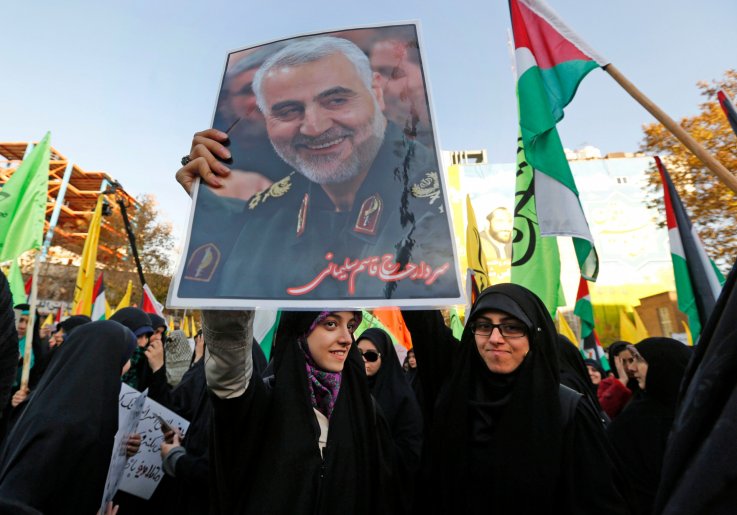Oil market watchers fear a new round of Iranian attacks on energy infrastructure following America's assassination overnight of one of Tehran's most senior generals in an escalating tit-for-tat conflict that threatens to send oil prices spiraling.
The Pentagon said President Donald Trump directed a drone strike in Iraq that hit a car carrying Major General Qassem Soleimani, leader of the Quds Force, a foreign unit of the Islamic Revolutionary Guard Corps (IRGC) and designated as a terrorist organization by the U.S.
It followed a chain of recent events beginning with rocket attacks on joint U.S.-Iraqi military installations including one attack that killed an American civilian contractor and injured several service personnel.
Since then, the U.S. conducted airstrikes on an Iranian militia in Iraq and the American embassy in Baghdad was attacked by violent demonstrators orchestrated, according to Washington, by Tehran. Now, Soleimani is dead and Washington advised American citizens to leave Iraq.
In the aftermath of Soleimani's death, oil prices spiked. At the time of writing, both WTI and Brent crude oil were up around 3.5 percent several hours after the drone strike. WTI was $63.35 a barrel and Brent was $68.62.
Iran's Supreme Leader Ayatollah Khamenei pledged to "seek revenge" for the killing of Soleimani, who led the Iranian military support for the Assad regime in Syria's brutal civil war.
Last year, Iran was accused by Washington of attacking several oil tankers in the Strait of Hormuz. Tehran openly seized and later released other tankers it alleged were violating its territorial space.
Washington also accuses Iran of being behind the missile strike in September on the Abqaiq and Khurais oil processing facilities in Saudi Arabia, which temporarily knocked down a substantial source of oil supply to the global market. Iran denied responsibility.
Trump has repeatedly called for the world's oil-producing nations to increase oil supply to push down prices. But his escalation of the conflict with Iran risks greater destabilization of the Middle East—a major source of oil supply—and as a consequence further increases in oil prices.
"This is a seismic event in the region," Professor Jason Bordoff, a former energy adviser to the Obama administration and now director of Columbia University's Center on Global Energy Policy, wrote on Twitter.
"This is how US-Iran tit-for-tat spirals out of control. Iran's response will be severe & deadly. And certainly may include escalating attacks on energy infrastructure—Abqaiq was just the beginning."
Ilan Goldenberg, Middle East security director at the Center for a New American Security think tank, tweeted: "Don't be surprised if the Iranians launch a bunch of missiles at Saudi and UAE especially at US bases but also oil facilities. They surprised us in September with their accuracy but they purposely tried to keep the damage to a minimum. This time they may not do that."

Alexander Kozul-Wright, a commodity analyst at Capital Economics, told Newsweek that oil prices were rising even before the drone strike.
"This positive momentum could mean that prices remain elevated as a result of the escalation in tensions," Kozul-Wright said.
"Clearly, the price of oil would soar in the event of full-blown military conflict in the Middle East. Here, we suspect that Brent could reach $150 per barrel.
"However, this rally would probably be short-lived as supply networks would adjust and demand would slump in the wake of higher prices. Admittedly, we think that the probability of a proxy war between Iran and the U.S. remains unlikely."
Kozul-Wright continued that "in any event, we think that oil prices will end the year higher based on supply and demand fundamentals."
John Tirman, executive director at the Massachusetts Institute of Technology Center for International Studies, told Al Jazeera that Iran will certainly retaliate although not through a direct confrontation with the U.S. "They will perhaps attack Saudi tankers again, maybe Saudi oil refineries again," Tirman said.
Rapidan Energy views Iran's most likely next targets to be Saudi-owned oil assets: the refineries in Yanbu, the Safaniya oil field in the Persian Gulf, and, once again, the Khurais oil field, S&P Global Platts reported.
The U.S. said it killed Soleimani to prevent further attacks by Iran. "General Soleimani was actively developing plans to attack American diplomats and service members in Iraq and throughout the region," the Pentagon said in a statement, accusing the Quds Force of responsibility "for the deaths of hundreds of American and coalition service members and the wounding of thousands more."
"He had orchestrated attacks on coalition bases in Iraq over the last several months–including the attack on December 27th–culminating in the death and wounding of additional American and Iraqi personnel," the Pentagon statement continued.
"General Soleimani also approved the attacks on the U.S. Embassy in Baghdad that took place this week. This strike was aimed at deterring future Iranian attack plans. The United States will continue to take all necessary action to protect our people and our interests wherever they are around the world."
This article was updated with comments by Alexander Kozul-Wright.
Top stories - Google News
January 03, 2020 at 03:11AM
https://ift.tt/2FiLePV
Trump's Strike on Iran General May Escalate Attacks on Saudi Oil Targets - Newsweek
Top stories - Google News
https://ift.tt/2FLTecc
Shoes Man Tutorial
Pos News Update
Meme Update
Korean Entertainment News
Japan News Update
Bagikan Berita Ini















0 Response to "Trump's Strike on Iran General May Escalate Attacks on Saudi Oil Targets - Newsweek"
Post a Comment